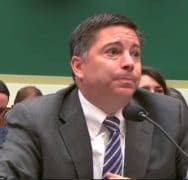He’s been a champion of rule “modernization” — a.k.a. increased deregulation — of the radio industry. He’s been the No. 1 battle leader against the scourge of unlicensed radio operations that have polluted the FM radio band from Jamaica Plain to North Miami.
And, come January 21, 2021, Mike O’Rielly‘s reward for these efforts as a Republican Commissioner on the FCC will likely be moving boxes and fond memories of his service at the agency.
With the White House yanking his renomination over a squabble tied to his stance on Section 230 of Communications Decency Act, O’Rielly’s days are likely numbered at the FCC. While it was believed by some that O’Rielly could be renominated under a Biden presidency, those thoughts are now fading.
As such, comments made in prepared testimony before the House Energy & Commerce Committee’s Subcommittee on Communications and Technology on Thursday appear to indicate his recognition that his pending departure is all but inevitable.
“Today is likely the last time I will testify before Congress as a sitting member of the Commission,” he said, noting that the FCC is where he began his professional career, in 1994.
He also took pride in the amount and quality of work product he’s accomplished for the American people in his time on the Commission, calling it “a tremendous honor to hold this position.”
O’Rielly said, “I have approached the role as though you were in my seat, guided by fidelity to the law and the will of lawmakers; respect for the millions of Americans you represent here in Washington; regard for those appearing before the Commission and the arguments they raise; and a determination never to take a single day, meeting, site visit, or conversation for granted.”
He then opted to paraphrase former President Ronald Reagan in his farewell address
to the nation by noting, “My team and I weren’t just marking time. We made a difference.”
O’Rielly noted in his testimony some of the accomplishments he’s directed at the Commission: freeing up spectrum for new commercial purposes, improving communications networks and, of course, “modernizing regulations.”
He said, “I have also spent considerable effort on updating our regulations
and rules to reflect the modern communications marketplace. Simply put, the regulatory models governing broadcast, cable, telecom, and satellite services are vastly out of line with the digital transformation of our society and the fierce competition from completely unregulated companies. As a result, our regulatees are hamstrung at the expense and to the detriment of the American consumers. While improvements have been made, fundamental reform hasn’t been achieved during my time at the Commission, and our outdated regulatory rules and structural silos unfortunately remain in place. This
archaic framework also permeates basic market definitions that are used by other agencies, particularly the Department of Justice.”
In a matter of months, that “modernization” effort could be left up to Chairman Ajit Pai and GOP Commissioner Brendan Carr — with the addition of Nathan Simington should President Trump be re-elected.
If Biden wins, it is now likely Jessica Rosenworcel — a critic of much of the GOP-led FCC’s modernization efforts — would serve as Chairman. As such, O’Rielly and Pai would be bounced, creating two holes. One seat would go to a Democrat, while the other would go to a Republican.
Some initially believed that Republican could be O’Rielly, who’d be forced to sit out as Rosenworcel did in early 2017 following the change in executive branch leadership.
Now, it is clear that won’t happen, putting an end to O’Rielly’s tenure on the FCC.
RBR+TVBR OBSERVATION
Farewell To A Gentleman Leader
Once upon a time, the editor-in-chief of this publication was the Assistant Press Secretary to then-freshman House Member Maurice Hinchey (D-N.Y.). He’s now deceased — as is the bipartisan spirit of Congress circa January 1993. Two short years later, partisanship led by the “Republican revolution” greatly transformed Capitol Hill and D.C. politics. It was no longer “I don’t like your bill at all. Sorry … now let’s golf.” This caustic, mordant way of life continued for years, leading President Trump in his 2016 campaign for the White House to repeatedly call for “draining the swamp” — referring indignantly to Washington, D.C.’s oppressively humid summers and the stagnant stench coming from the halls of Dirksen, Hart, Russell, Rayburn, Cannon and Longworth.

Rising above all of this until very, very recently was the FCC. Bipartisanship and cordial communication between members was never about Republican vs. Democrat. Then came Tom Wheeler, and Title II Classification for Broadband. Republicans howled. Then, they gained control under Ajit Pai and erased Wheeler’s shaky “net neutrality” order. Democrats responded with a vicious attack on the Pai Commission — led by the leaders of the House E&C Committee and Subcommittee on Communications and Technology.
Meanwhile, O’Rielly became a political pawn in a much more severe manner than Rosenworcel did in early 2017. He’s leaving and not returning. Rosenworcel, who may be one of the few beloved and respected policymakers across both aisles, is now a veteran of days gone by.
It didn’t have to be this way, and it is the fault of the executive branch and of Congress. The actions of Frank Pallone Jr. and Mike Doyle are childlike, buffoonish and unbecoming of Congressional leadership. Instead of attacking, working together and reaching compromise should be the tact — especially because their actions mimic the very “our way or no way” approach to politics the GOP inflicted on Washington in 1995.
O’Rielly’s exit is shameful. He has integrity. He’s sticking to his guns as a strict constitutionalist. And, he’s been a good friend to those on the Commission who may be polar opposites when it comes to policy. Radio deregulation? Please … his original draft, with the aid of the NAB, is appalling. Having one company own every radio station in Scranton-Wilkes Barre because of digital media is a problem that has everything to do with programming, and marketing, and nothing to do with underregulation of Google, Facebook and other local digital platforms with better CPP and ROI.
Yet, we highly respect O’Rielly, and admire him for tackling pirate radio when no one else had. Our editor-in-chief wrote about pirate radio for The Miami Herald as a contributing writer nearly twenty years ago. Unlicensed operations finally got what they deserved under O’Rielly-penned policymaking.
Lastly, while Pai loves radio and we love his fondness for small AM stations in the Midwest and rural parts of the U.S., it is O’Rielly who has been radio’s biggest champion in Washington — even if some of his ideas have been out of sync with what we believe is best for an industry that already saw rapid consolidation under President Clinton. How many jobs have been lost since then? How much format diversity is there within earshot of the FCC’s own offices? Seriously, the D.C. radio dial had more to offer in 1991 than it does today.
We salute Mike O’Rielly on his exceptional tenure at the Commission and look forward to hearing where he lands next. And, if a surprise move by the Biden White House in 2021 results in O’Rielly’s return to the Commission, we welcome him back with open arms. We may not agree with him on a lot of his policy, but leadership goes beyond total lock-step nods.
O’Rielly is a leader. He will be missed.
The views expressed by the Radio + Television Business Report do not necessarily represent the views of Streamline Publishing or its other publications.





